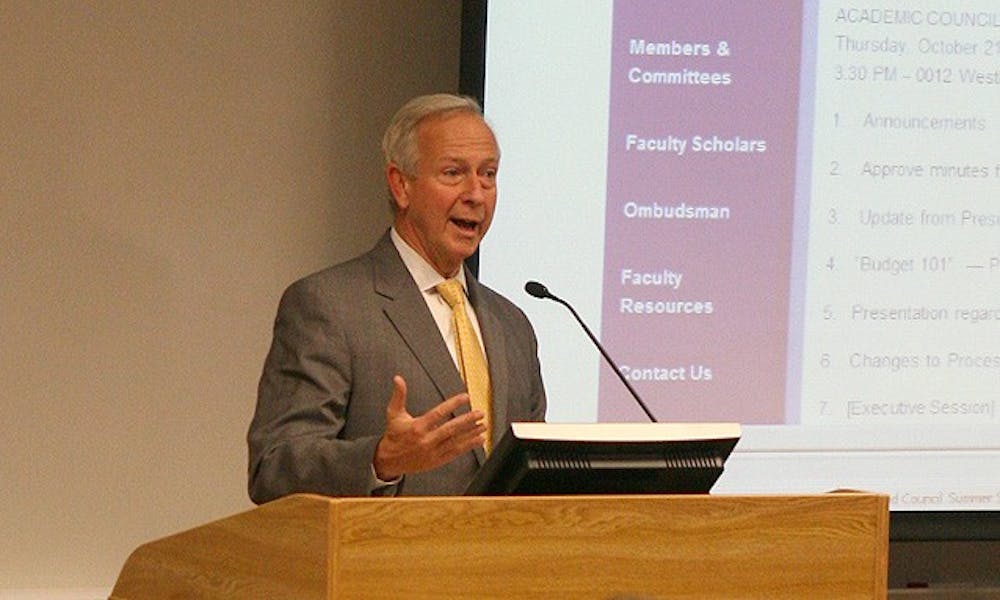University officials provided a detailed presentation to faculty members Thursday regarding the underlying processes and structure of Duke’s budget.
Provost Peter Lange and Executive Vice President Tallman Trask explained the University’s revenue, expenditure and management structures at the Academic Council meeting Oct. 21. James Roberts, executive vice provost for finance and administration, gave an overview of Duke’s accounting system. The presentation followed a request by Council Chair Craig Henriquez and professor of biomedical engineering, who asked for clarification of Duke’s budgetary system.
The administrators explained the University’s management center budgeting strategy, which decentralizes resource allocation decisions to academic deans. In this way, deans are primarily responsible for balancing departmental budgets and deciding in which areas to make cuts.
“[Deans] have a responsibility to improve academic programs as much as possible and hit the right balance... in cutting programs,” Lange said. “Rarely have we said, ‘You need to make this cut and this is how you need to do it.’”
If departments generate surplus revenue, Lange said deans can use this money at their discretion for academic purposes.
Lange also elaborated on the revenue sources for Duke’s schools, including the Fuqua School of Business and the School of Law.
“The Law School has extremely stable tuition. The likelihood that Arts and Sciences and Law will not hit its tuition target is very unlikely,” Lange said. “For Fuqua, [there are] a lot of tuition programs. Some go up and some go down. They are more dependent on the external environment. The amount of risk in the budget from tuition is higher.”
President Richard Brodhead also addressed faculty members, providing a brief update on the Board of Trustees meeting earlier this month. Brodhead said the Board focused its discussion on the endowment, undergraduate admissions and global strategy, among other issues.
At Henriquez’s request, Brodhead also discussed a recent op-ed article that appeared in The Herald-Sun, which lists compensation bonuses for several officials in the Duke University Health System and Duke Management Company. Brodhead noted that University administrators did not take any salary bonuses.
“[The article] neglected to note that the numbers in question were from calendar year 2008 and thus were from the period before the financial downturn and lack of salary increases,” Brodhead said. “Secondly... people who work at DUMAC and people who work in executive positions in the health system are not compensated with a flat salary—they are compensated with a base salary and then an ‘at-risk’ salary.”
In other business:
James Siedow, vice provost for research and professor of biology, gave a presentation addressing potential changes to faculty summer salaries.
The changes will only affect faculty members who are employed nine out of 12 months and receive federal research funding—excluding medical school faculty and professors who receive non-federal grants. Siedow added that new federal research standards require professors to complete their grants at the same time they receive compensation for their research.
“Federal sponsors increased the emphasis to align compensation for effort on a funded project with the time that the effort actually occurs,” read Siedow’s presentation. “In response, Duke conducted a review of nine-month salary appointments and identified issues to address this.”
Get The Chronicle straight to your inbox
Signup for our weekly newsletter. Cancel at any time.

